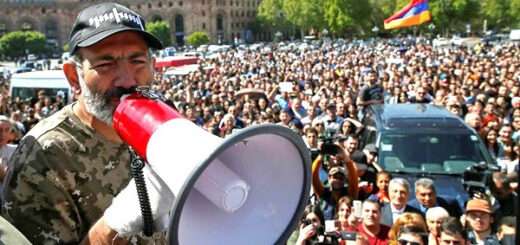From Manifesto to Policy: How Armenian Prime Minister Nikol Pashinyan’s 2005 Vision Served Globalist Objectives

If one were a strategic globalist, neoconservative (neoliberal interventionalist, if you wish) policy maker, whose goal was the global economic supremacy of the United States, the strategic incapacitation of both Russia and China would be mandatory. We witness these efforts today, especially in proxy engagements by players such as Ukraine, Israel, Turkey, and even smaller proxies such as those in the Southern Caucasus: Azerbaijan, Georgia, and Armenia.
Part of the globalist strategy includes reducing the influence of states with large ethnic blocs that do not serve the globalist agenda. Emerging states still defining their national ethos, such as Ukraine and Azerbaijan, are easy targets. Others, such as Japan and Armenia, both of which are nearly monoethnic (98%) and whose national identities are rooted in millennia of history, should top the list for globalist deconstruction. The former’s mono-ethnicity is tough to crack, but the latter is a different story.
Japan is an industrial and technological entity with a population of about 125M people that generally supports Western interests. Japan’s economic prowess has declined for at least two decades due partly to policies strongly suggested by the US. Since WWII, Japan’s culture is a blend of Western and traditional culture, with de-militarization constitutionally upheld. Even with over 50,000 US soldiers stationed in Japan, the Japanese constitution has been reinterpreted to allow Japan to maintain self-defense forces and engage in limited military activities. Japan serves the interests of globalists, as is.
Western European societies have been stirred with massive immigration from wars in North Africa, Western Asia, and Ukraine. What once may have been traditional French or Italian positions have been strongly modulated by massive immigration and an EU superstructure that sets policies invoked by individuals whose positions were attained by multiple levels of indirect voting and appointment. Yet the system is not entirely devoid of accountability; yet full sovereignty of EU member states has been compromised. The staunch anti-Russian behavior of the EU regarding Russia’s Special Military Operation in Ukraine should be considered a victory for globalists.
However, states such as Ukraine and Azerbaijan were born out of the disintegration of Tsarist Russia, and neither existed as states before 1918, after which both were absorbed into the Soviet Union. The Ukrainian People’s Republic was proclaimed in 1917 with Kiev as its capital, and the Republic of Azerbaijan in the spring of 1918. Both were geo-ethnic entities in search of a national ethos. Ukraine became anti-Russian to the point of neo-Nazism by WWII, and Azerbaijan was encouraged to magnify its Turkic element at the expense of its Iranian traditions. The Republic of Turkey, having its Western reconditioning, ushered in by Mustafa Kemal, created the core of Azerbaijan’s Turkic-centricity and was encouraged by the Soviets to a certain extent to counter Armenian national aspirations, especially after the catastrophic 1915 Turkish genocide of the Armenians. With the Ukrainian national ethos in conditional flux, its anti-Russian persuasion was used both during the Cold War and after, culminating in the 2014 coup organized by the West and subsequent existential threat to Russian interests. Newly formed states with national ethos still in flux are in danger of their emergent ethos being manipulated in the interests of stronger powers. Even established societies were in danger of deconstruction. A goal of Soviet social engineering was deconstructing constituent ethnicities and constructing a Homo Sovieticus population. However, none of this reflects cultures that naturally evolve.
Neoconservative/neoliberal globalists are constantly in search of allies, proxies, social movements that can be co-opted, weaker states that can be manipulated by promises, covert intervention, and personal gain by those either in power or who can replace incumbents. Their goal is long-term, and the strategy is to use or engender (including regime change) any proxy that can either engage Russia (and eventually China), ideally surrounding Russia with multiple conflicts, hoping it would fold like the Soviet Union. A classic example was the rise to power of Georgia’s Mikael Saakashvilli, who became the darling of the West by adopting an anti-Russia, pro-EU policy, with aspirations to join NATO. The West gave him enough rope that he instigated the 2008 war with Russia, with the West sitting back and watching as Georgia lost territory to Russia. Saakashvilli came to power with an overtly Western-supported anti-corruption (read as anti-Russian) platform. Indeed, Saakashvilli implemented positive local changes that can be observed today, but he had a short shelf life. He was voted out of power, and today, Georgia does not view Russia as the threat once percieved. China has invested heavily in Georgia, which is in contrast to the West, which, in 2022, suggested Georgia open up a second front against Russia. Georgia wisely decided against political suicide. Ultimately, Georgia’s EU dream dissolved into the illusion it had always been.
Armenia does not share a border with Russia; Georgia is squeezed between them and Azerbaijan. Armenia was an active member of the Moscow-led CSTO (the Collective Security Treaty Organization) and is a member of the Eurasian Economic Union (EAEU or EEU). Much of Armenia’s infrastructure is owned by Russian interests, and over 90% of its hydrocarbon imports are from Russia. Russian soldiers guarded Armenia’s border with Turkey – but not anymore. Russia has a long-term agreement with Armenia to host the Russian 102nd Military Base in Gyumri, Armenia. In 2018, Pashinyan came to power in a Western-supported movement that ousted the previous pro-Russian government, widely seen as corrupt, creating the centerpiece of a narrative that Armenia’s financial problems would be solved by eliminating the incumbents. Pashinyan’s movement was not openly anti-Russian, considering Armenia’s strong economic ties with Russia. However, it did not take long for Pashinyan and his appointees to consolidate power across the board. Pashinyan presided over the engineered defeat of Nagorno-Karabakh, conceding to Azerbaijan’s conquest of that land. Pashinyan was immediately re-elected in the aftermath of the post-war chaos. In 2023, Azerbaijan ethnically cleansed 120,000 Armenians from Nagorno-Karabakh. Pashinyan referred to Nagorno-Karabakh as a significant burden on Armenia. Any leverage that Russia had over both Armenia and Azerbaijan with the frozen Nagorno-Karabakh conflict was removed. Azerbaijan’s border with Iran expanded by over 200 km and became ripe for clandestine operations against Iran, particularly Israel.
There are discussions about connecting rump Azerbaijan with its exclave Nakhichevan across southern Armenia at the Iranian border. Such a corridor, called the Zangezur Corridor, would connect Turkey with Azerbaijan and on to Turkic central Asia, greatly enhancing an east-west Turkic-run trade route at the expense of a north-south China-India-Iranian-Russian (the latter across the Caspian, through Azerbaijan, or Armenia into Georgia). Iran vehemently opposessuch a cutoff of its border with Armenia, since this corridor may not be under sovereign Armenian control. Leaks have emerged about this corridor being run by an agent under US supervision. Surely, Russia and Iran (India and China) will not sit idle and allow this to happen.
Azerbaijan has made many demands of Armenia since its successful military conquest and ethnic cleansing of Nagorno-Karabakh. Among the demands that have been made public, Baku demands that Armenia’s constitution be changed. Baku requires that Azerbaijanis who fled Armenia over thirty years ago be allowed to reside in Armenia, with the establishment of mosques and other Islamic infrastructure. Turkey demands that all Armenian national emblems with an image of Mt Ararat be changed. Since Pashinyan was ushered into power, the population has been depatriotized in a relative sense; even flag are few and far between. Armenia is in close contact with globalist EU leaders such as France’s Macron, and EU High Representative Kaja Kallas, the latter visited Armenia on 29 and 30 June 2025. Armenia currently is jailing opposition leaders and has nationalized the Armenian Electrical Grid and jailed its owner, Samvel Karapetyan, a dual Russian and Armenian citizen, claimed to be the richest Armenian in the world, on charges of sedition for supporting the Armenian Church, as Pashinyan has jailed archbishops on charges of sedition.
Why would a powerful and influential globalist movement care about a postage-stamp-sized country like Armenia? What did Western globalist forces see in Nikol Pashinyan as a potential Armenian leader that would serve their interests? If I were among the ranks of a globalist network, looking for the next, even tiny, ally in an anti-Russian campaign, I would read Nikol Pashinyan’s curriculum vitae with great vigor. The job description would include: (a) the ability to come to power with a track record of being jailed by the existing pro-Russian power structure, (b) keep enough of the plutocracy active so to as not to collapse the economy, (c) have an ideology that included blaming the Armenian people for their tragic history, (d) blaming Armenian historians for distorting their history, (d) keeping the otherwise patriotic Armenian diaspora operationally at bay, (e) wanting to reset Armenian history with a clean slate, with public re-education as a start, (f) a bonus would be if Pashinyan could engineer the conditions to abandon Nagorno-Karabakh and still stay in power. These qualifications and many others serve a globalist agenda by:
1) Rejecting one’s past because that past has resulted in today’s ethos. That ethos, in the form of an ethnic bloc, does not serve the interest of those creating conditions that weaken Russia and, eventually, China. Armenians have traditionally demanded recognition for the genocide committed by the Turks and, to a lesser degree, justice to be served. As a result, Armenia was an irritant on the international stage to globalists and many others.
2) Remove the Russian use of the frozen Nagorno-Karabakh conflict as a political lever against both Armenia and Azerbaijan, but particularly Azerbaijan.
3) If Armenians can be blamed for their genocide, item (1) is reinforced and sets conditions for minimal societal opposition to the normalization of relations between Turkey and Armenia. An Armenia subservient enough to pan-Turkic demands would agree to a extraterritorial Zangezur Corridor. A Western geopolitical and economic road extending from Turkey through the Southern Caucasus is an existential threat to Russia. Note: Turkey has a border with Georgia, and Georgia has a border with Azerbaijan. An equivalent corridor could pass through Georgia. However, a corridor across Armenia manifestly reduces Armenian sovereignty over its internationally recognized territory, making it easier for other interests to control.
Nikol Pashinyan was a journalist twice jailed for opposing the pro-Russian governments that preceded him. In 1998, he founded Haykakan Zhamanak (Armenian Times) newspaper and was its editor from 1999 to 2012. In the December 9, 2005 issue of Armenian Times, Pashinyan wrote an editorial on page 3, entitled, “Forget the Heroic Past.” Curiously, the entire online archive of Armenian Times, December 2005, is empty. Images of this article and references to it appear randomly on Facebook. It took a visit to Armenia’s National Library to get a copy. Below is an image of that article taken from the hard paper copy. Those reading this in Armenian are duly horrified, as they have witnessed Pashinyan’s 2005 manifesto becoming reality.
| Element | Implementation |
| Intellectuals create a glorification of Armenian history. Historians can change that. |
Armenia has begun rewriting the elementary school history books; this is an example. |
| Armenia’s ancestors bequeathed nothing, actually less than nothing and Pashinyan must start from zero. |
Pashinyan has proposed that images of Mt. Ararat be taken off of state emblems, a change in Armenia’s national anthem, a change in the constitution, and referred to diasporan Armenians as anti-constitutional. Government-sponsored cultural events do not reflect folk traditions. Pashinyan has been bold enough to attack the Armenian church and arrest archbishops. |
| Armenian ancestors have bequeathed to us genocides, humiliations, betrayals, etc. |
Pashinyan has downplayed/deprecated the genocide of the Armenians and its pursuit of justice. |
| Pashinyan condemns his ancestors, cursing them because they did nothing for a more dignified and proud today, condemning those who praise Armenian ancestors. |
Historical Armenia and ‘real Armenia’ are not compatible. Pashinyan sees dissonance or dichotomy between the people’s interests and their state. Only Turkey and Azerbaijan challenge Armenian history in any form. |
| Pashinyan condemns Armenians for having been forced to migrate from place to place. | Yet under his watch, Armenia lost Nagorno-Karabakh and the forced cleansing of 120,000 plus Armenians. He justifies this by claiming Nagorno-Karabakh was a political and economic burden, brought upon us by exaggerated hopes and distorted beliefs. |
| Let us forget what is considered Armenian history and start over, including genocide. |
Pashinyan conflates ‘real Armenia’ with genocide recognition and transitional justice with the definition of Armenia. These are, in practice, exclusive. Turkey, Azerbaijan, and much of the West want such issues buried and forgotten. |
| Pashinyan sees no role for any level of classic patriotism in his manifest vision. |
Pashinyan and his party have no isms, yet define patriotism aseconomic success. |
This Armenian scenario is one that plays out frequently in history, often with profound consequences. The electorate, frustrated by economic hardship, cultural shifts, or perceived decline, blames the outgoing leadership for their relative deprivation, even if complex or global in nature. When people vote based on resentment rather than policy, they often empower figures who exploit grievances rather than solve problems. Humans naturally seek somebody to blame even if the causes are impersonal. Once in power, the politician’s true agenda unfolds with a consolidation of power, weakening checks and balances, suppression of opposition, or manipulation of media. All this is happening to Armenia. Much of this could have been avoided by a better-informed electorate which is harder to manipulate with oversimplified blame narratives, civil society exposing hidden agendas before it is too late, and voting based on detailed platforms rather than charisma or resentment.
When voters prioritize cathartic blame over governance, they risk enabling leaders whose real agendas are far more destructive than the problems they promised to solve. History shows that the consequences can be catastrophic, not just for the disillusioned supporters, but for society as a whole.
In the era of policy vagaries, Armenian Prime Minister, Nikol Pashinyan, has remained steadfast to his twenty-year-old manifesto, to the delight of those forces who are engineering a generic world citizen. The Soviets tried it and failed. It appears Pashinyan has not learned from history which is not surprising since he rejects all of it. Ironically, history will not treat his legacy kindly.
Yerevan, Armenia
David Davidian is a Lecturer at the American University of Armenia. He has spent over a decade in technical intelligence analysis at major high-technology firms. He resides in Yerevan, Armenia. A compendium of his articles can be seen on shadowdiplomat.com





